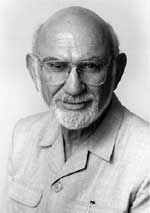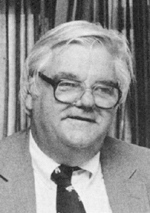Robert Grosse
Robert Nathan Grosse, professor emeritus in the School of Public Health (SPH) and the A. Alfred Taubman College of Architecture + Urban Planning died March 21 in St. Petersburg, Fla., after a brief illness. He was 82.

“In an era in which we in public health are placing increasing emphasis on global health, it is especially poignant to learn of Bob Grosse’s death,” says former colleague Kenneth Warner, the Avedis Donabedian Distinguished University Professor of Public Health. “He played a significant role in bringing formal methods of health planning to public health colleagues in developing countries. Through his work alone, U-M SPH alumni groups sprouted in such countries as Indonesia.”
Grosse joined the University faculty in 1968. He initiated the program in health and economic development in 1974 and was its director until 1985. He served as chair of the Department of Health Planning and Administration from 1980-82.
In 1985, he was appointed professor in the Department of Population Planning and International Health, and directed until his retirement in 1992 its international health degree program at both the master’s and doctoral levels. In 1990, he was appointed professor of urban, technological and environmental planning in what was then the College of Architecture and Urban Planning.
A health-planning model Grosse developed has been used by a number of countries to help make decisions about the allocation of public funds to the health sector. His research on identifying the determinants of health status in developing countries led to studies on the effects of water supply and sanitation investments, and the relationship of literacy and education to health status. His work with the World Health Organization and other entities took him to Asia, South America, Europe, Australia and the Middle East.
“When working overseas, he was the anti-ugly American,” recalls Grosse’s son, Daniel. “He thoroughly immersed himself in each region’s literature, culture, history and politics.”
Grosse was born in New York City and grew up in Brooklyn and Manhattan in a culturally and politically aware household. He received his bachelor of arts degree from Columbia College and his master’s and doctoral degrees in economics from Harvard University.
After graduation, he worked with the Harvard Research Project on the Structure of the American Economy and with the United States Bureau of the Budget’s Office of Statistical Standards. He also worked at the Rand Corporation, where he helped to develop methods of systems cost analysis and headed a project to design the Defense Department’s program budgeting system.
During the Johnson administration, Grosse worked at the U.S. Department of Health, Education and Welfare, pioneering methods for analyzing the relationships between expenditures and outcomes of social programs.
An avid tennis player and a voracious reader, especially of plays, Grosse enjoyed travel, theater and spectator sports. He served on the boards of several nonprofit organizations, including the Ann Arbor chapter of the American Civil Liberties Union.
Grosse is survived by his wife, Marilyn Scott; three sons; one stepson and one stepdaughter; and five grandchildren. His first wife, Pearl Feldman Grosse, died in 1991.
John D. Stevens
John D. Stevens, a former chair of the Department of Communication, died March 10 at Arbor Hospice Residence. He was 71.

Stevens chaired the department from 1984-87 and retired from U-M in 1997 after 30 years teaching journalism and communication. His teaching and research focused on the First Amendment and the history of American media.
Stevens authored five books and more than 60 journal articles, many of which traced Americans’ struggle to speak out for social justice or to dissent against the force of popular public opinion in times of national crisis. He also wrote about how the media sometimes unfairly characterized African Americans and other minorities. Stevens’ scholarly work is widely cited.
A former newspaper reporter and editor, he began his career at the Terre Haute (Ind.) Star. Stevens also was a freelance writer for magazines and, for a time, edited his own magazine. He taught at the universities of Oregon and Wisconsin and guest lectured at many other universities.
Stevens held various offices in the Society of Professional Journalists, and was active for many years in the Association for Education in Journalism and Mass Communication (AEJMC).
He was a former head of the AEJMC history division.The Midwest Division of the AEJMC in 1997 named an annual prize for outstanding student scholarship in his honor.
He spent 1988-89 in New York City as a Freedom Forum Fellow. He also was a fellow for one summer at the East-West Center in Hawaii.
Stevens was a widely known teacher and scholar, and presented dozens of scholarly papers at the annual meetings of other organizations, such as the American Popular Culture Association.
Stevens earned his bachelor’s degree in journalism and political science from Indiana University in 1955. He also earned a master’s degree from Washington State University and a doctorate from the University of Wisconsin.
He is survived by his wife, Gwen Stevens of Ann Arbor; a daughter, Victoria Keinert of Ames, Iowa; a son, Jeffrey Stevens of Ann Arbor; stepchildren Phil, Glen, Jim and Linda; and nine grandchildren and step grandchildren.
A celebration of his life was held March 19 in the Michigan League’s Hussey Room.
Contributions may be made to either the Diabetes Research Fund, U-M Medical Development, 301 E. Liberty, Ste. 400, Ann Arbor, MI 48104, or Arbor Hospice Residence, 2366 Oak Valley, Ann Arbor, MI 48103.—Submitted by the Department of Communication Studies

